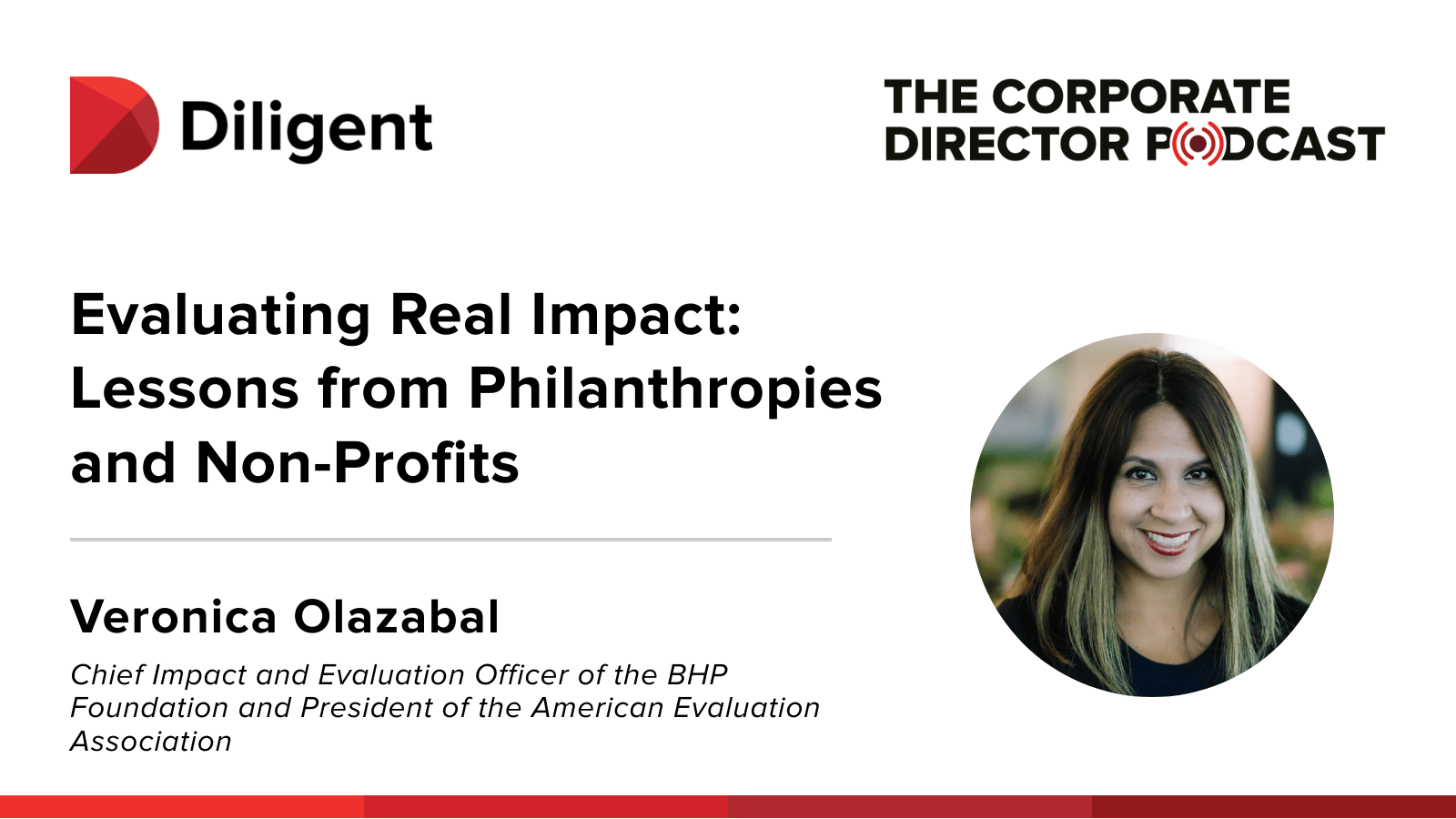Evaluating Real Impact: Lessons from Philanthropies and Non-Profits
Listen to Episode 90 on Apple Podcasts
Guest: Veronica Olazabal, Chief Impact and Evaluation Officer of the BHP Foundation and President of the American Evaluation Association
Hosts: Dottie Schindlinger, Executive Director of the Diligent Institute, and Meghan Day, Vice President of Marketing for Diligent ESG & Data Intelligence
Summary:
In this episode of The Corporate Director Podcast, Veronica Olazabal, Chief Impact and Evaluation Officer of the BHP Foundation and President of the American Evaluation Association discusses impact evaluation in the philanthropic and non-profit space and the questions leaders should be asking to make their organizations more sustainable.
In this episode:
- Measuring and Evaluating Impact: Olazabal digs into the key questions leaders should be asking around impact evaluation.
- Decolonizing Wealth: Olazabal discusses changes happening in the world of philanthropy to make it more equitable, accessible and driven by those receiving the capital.
- Bringing in Smaller Organizations: Olazabal talks through how to elevate smaller nonprofit organizations in the space.
Measuring and Evaluating Impact
Olazabal begins with an overview of how impact evaluation is changing: “In the philanthropic space, what I do is measurement, evaluation, learning and strategy. When you get to the details, it’s about improving your practices, how you think about and measure impact, and on the other hand establishing checks and balances to hold ourselves accountable. Now, that’s moving from being technical to strategic.”
She goes on, “Often times, when they think about accountability the private sector is great with measurement. They take that same lens to the issue around impact. What I think is missing from this conversation is how we actually know something is true. In financial markets, you don’t think twice about hiring a finance expert to manage that aspect of the business. You think about audit and assurance processes. But, when they turn to impact and ESG, it feels foreign. Many use a boilerplate ESG rating system and are not asking about the right talent needed to think about ESG more sophistically and holistically.”
On the other hand, Olazabal notes, organizations think that if they choose metrics and roll those out through line managers and the supply chain, they will be able to report on them and people will believe the organization is doing the right thing. “The challenge is that we are all incentivized to do different things,” says, Olazabal. “How are you demonstrating behavior around impact? Board members aren’t asking the hard questions about what could go wrong and what’s not working.”
Decolonizing Wealth
Olazabal discusses philanthropy in a world that has changed immensely as a result of the pandemic and a social justice reckoning: “Philanthropy is trust-based at its core. At the end of the day, the people who are best positioned to do good work by, say, spending venture capital, are the organizations who are working with actual people. The critique of a lot of philanthropy is that we approach instead from the top-down. Lately, this has led to deep conversations about decolonizing wealth, which speaks very much to the moment we are in.
She explains, “How do we share wealth in a way that doesn’t reinforce these top-down micro-managing practices? If you start being specific about capital, you aren’t looking at governance issues, and you may be setting yourself up to fail. This is a big tension: Philanthropy only accounts to 7% of finance in this space, not including private sector. We are a drop in the ocean. We can’t support and fund everything.”
According to Olazabal, we can begin this process by looking at leverage points and catalyzing a ripple effect across systems, which can be difficult to do if you deploy capital in a broad stroke: “How does that affect venture capital?” says Olazabal, “This sits outside philanthropy and private sector but is a bit of both. In traditional philanthropy, we learn about providing support to different organizations. What we miss is the concept of scale, which the private sector is really good at. We put our capital into proving impact without sustaining it or scaling it. Is this really a good solution? Instead, we should bring these two practices together around the questions being asked in corporate board rooms on risk, strategy, sustainability and scale.”
Bringing in Smaller Organizations
Olazabal then turns to what she calls the art and science of philanthropy: “When we look at capital allocation, by default, you ask scale and sustainability questions from the beginning, which means you are making strategic choices right off the bat. If you want to fund scale-factored proven processes, this is really for more established and larger organizations. You can be the funder that makes a different choice. Or, she says, you can decide to be laser-focused on a specific issue: “This is the difference between point-based solutions and investing in systems. If it’s in a system, you aren’t looking at each one. You are looking at them collectively. Do you want to go deep or broad?”
Also in this episode…
Olazabal talks about her and her husband’s latest passion project: “My husband is a chef! During the pandemic, we launched a food venture that went mobile. Rather than a traditional food truck, he custom-made and redesigned a Volkswagen Eurovan and made it a Peruvian street food truck. We are thinking about broadening out to a headquarters soon!”
Resources from this episode:
- The Sandwicheria
- Originals by Adam Grant


